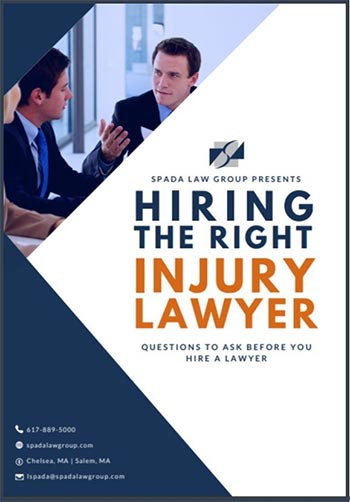 As we’re nearing spring in Massachusetts, the weather is just beginning to warm up from the dark and dreary winter. While temperatures may start getting warmer and the sun might shine more, there are still a handful of winter threats to be aware of – especially black ice in parking lots.
As we’re nearing spring in Massachusetts, the weather is just beginning to warm up from the dark and dreary winter. While temperatures may start getting warmer and the sun might shine more, there are still a handful of winter threats to be aware of – especially black ice in parking lots.
Black ice is everywhere this time of year. The common fluctuations in temperatures make the formation of black ice a fact of life in New England. One day, it may be nearly 60 degrees and snow and ice begins to melt, then the next day it may be 10 degrees and freeze everything that just melted. A dangerous cycle for pedestrians for sure.
What Is Black Ice And Why Is It So Dangerous?
Black ice is ice that is very hard to see because it is very clear and very thin. Because of its transparency, black ice appears to be the color of whatever the surface below it is, making it almost invisible and extremely dangerous.
With the varying temperatures in March and April, black ice forms often and everywhere. Whenever the Massachusetts weather gets above 32 degrees and then drops to 32 degrees or lower, there is a strong chance of black ice forming.
We are typically more aware of black ice on roads and streets but are not always aware of black ice on sidewalks, stairs, walkways, and parking lots.
The main reason black ice is so dangerous in parking lots – whether a commercial parking lot, an apartment or condo parking lot or the Peabody North Shore Mall’s parking lot – is because it’s so difficult to see. Black ice often appears as if there is no precipitation at all, or it may instead appear as a puddle or simply damp asphalt. You might be completely unaware of black ice until it’s too late.
Common Injuries from Slip and Falls on Black Ice in Massachusetts:
- Broken ribs
- Muscle sprains
- Ligament strains
- Hernias
- Spinal cord injuries
- Head injuries
- Broken or fractured wrists, ankles, hips
- Back and neck injuries
One of our clients was injured after she slipped on black ice hiding under a puddle in her work parking lot. She accidentally stepped into the puddle when getting out of her car and slipped on the hidden ice. She fell hard onto her left elbow. She ended up needing surgery on her shoulder, wrist, and thumb. She also developed carpal tunnel syndrome. For many reasons, it was a long hard-fought battle but we were able to convince the property owner’s insurance company that they were negligent and got her case settled for $175,000 settlement just prior to trial.
We recently took on another case involving a client who also slipped on black ice in a condo parking lot. When she slipped and fell, she broke multiple ribs and spent several days in the hospital. We expect another hard fight in this case but we are confident we will be able to help our client get fair compensation as the maintenance company failed to properly treat the black ice and there was inadequate lighting in the parking lot.
As you can see, black ice slip and fall injuries can be quite severe.
Tips For Walking On Black Ice In Massachusetts Parking Lots
If you are walking on black ice, or are uncertain if there is black ice, in a parking lot, there are a few ways you can try to prevent a fall:
- Test the Ground: Before you step out of your car, put one foot down on the ground and slide your shoe to test how slippery it is before stepping out and putting your full weight on your foot.
- Step DOWN, not OUT: When exiting your car in a parking lot, make sure you step down onto the ground and not out. Stepping down helps center your gravity, whereas stepping out makes it more likely that you will lose your balance and fall. Try to keep your feet flat, and continue to hold on to the door frame for support as you get out of the car.
- Do the Shuffle: If the ground is icy and slippery, you may need to walk with the penguin shuffle. Walk flat-footed and take short steps. This will help you control your balance and can prevent a slip and fall injury. If you walk with your heel touching the ground first, you are setting yourself up for a backward fall if you slip on the ice.
- Look Up: Keep a lookout to scan for ice ahead as you walk, and proceed slowly.
- Look for Salt and Sand: If possible, walk on areas of the parking lot that have salt or sand sprinkled on the ground.
- Keep Your Hands Free: Avoid putting your hands in your pockets while walking through the parking lot. If you lose your balance, having your hands available will help you break your fall.
What Is Considered Reasonable Care When It Comes To Preventing Black Ice?
All building owners are responsible for preventing black ice in their parking lots, just as landlords and tenants have a responsibility to keep their private property safe. Whether it is a commercial parking lot, a condo or apartment complex, or a strip mall, owners all have a responsibility to have safe parking lots and walkways. The building owner can be held liable if someone is injured in a slip and fall on ice or snow.
What does differ, to an extent, between different types of building owners is the level of care that is considered to constitute “reasonable care.” For example, it is entirely unreasonable for a commercial parking lot not to have any sand or salt sprinkled in the parking lot.
But what about a condo parking lot? Especially with supply chain issues these days, sometimes even getting enough sand and salt can be a challenge. In many cases, it could be found that a person who owns a couple of condos may not be held to the same level of care as a mall owner or a large multi-unit property owner. Some factors that play into this include the sophistication of the building owner and the likelihood of injury.
If, for example, a supermarket’s parking lot is not salted and sanded, the likelihood of someone slipping and falling and getting injured is quite high because of the number of people that go in and out of the store each day. A small condo association, however, likely has much less foot traffic than a commercial property or a business. The bottom line is that the more sophisticated the property owner (malls, large apartment complexes, businesses, etc.) the higher level of care they may be held to. We expect sophisticated property owners, who want our business and rents, to spend their money to ensure we can travel safely to and from their locations.
No matter where you were injured if you slipped and fell on ice, it’s important to contact a personal injury attorney to find out what your options may be.
Were You Injured In A Slip And Fall On Black Ice? Peabody Injury Lawyer Offers Free Consultations
We have decades of experience representing people who were injured after slipping and falling on black ice. If you slipped and fell on ice – whether on public or residential property – you have rights and deserve to be compensated.
We have offices in Chelsea, Peabody, and Worcester, but we proudly serve the entire state and can meet with you remotely from the comfort of your own home. Contact us for a free consultation to see how we can help you get the recovery you deserve after your injury. As personal injury lawyers, you never pay us a penny until we win your case.



